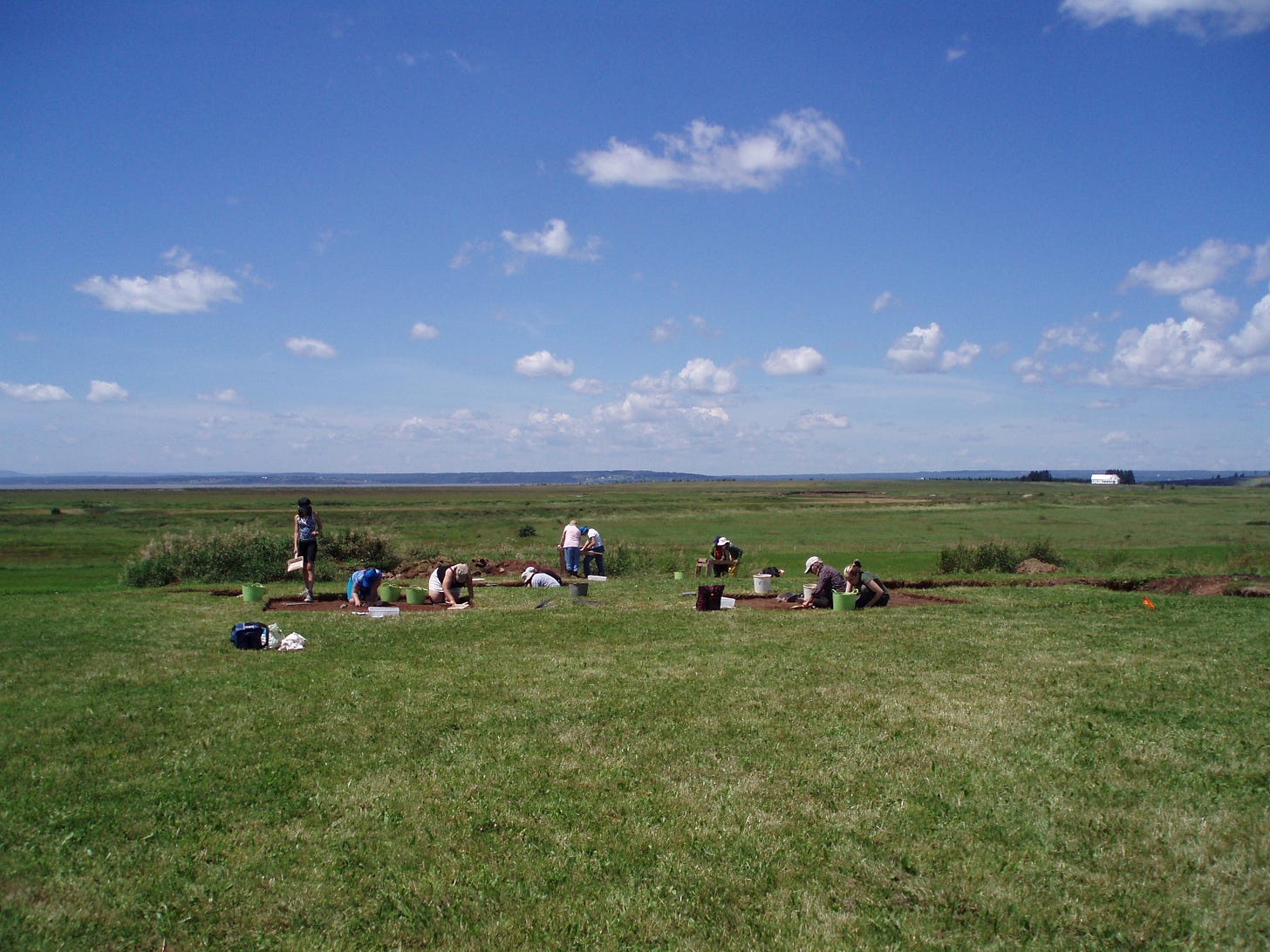That’s my youngest brother Glenn at a Parks Canada archaeological dig on the New Brunswick-Nova Scotia border. Little did we know in 2010 that joking around that we were digging in grandma’s basement might be true.
On the long drive from western Massachusetts through Maine to Sackville (which merged into Tantramar in 2023), New Brunswick, I gleefully “educated” him about some of his Acadian heritage. “Some of our ancestors were the founders of Beaubassin. They were farmers, traders, and fisherfolk. They built dykes and aboiteaux. Had lots of babies. Lived a pretty decent life.”
“Didn’t you bring some CDs we could listen to?” he asked. While he continued to watch the road ahead, he also managed to roll his eyes.
I continued. “Everything was pretty good, until the Grand Derangement. That translates to the Great Bother. We’re going to a place they once lived but were forcibly removed from by the British. And someone called that a bother. Or maybe an upheaval. Who does that?”
“Maybe they didn’t mind moving,” he said.
“I can still smack you,” I volleyed back. “Don’t you want to know something about the place we’re going to? And the people you come from?”
“I’ve always wanted to go on an archaeological dig,” he answered. “I didn’t say I wanted a college history course.”
And, yet, here you are, trapped in a car with me for 8 hours, I thought. Bwa-ha-ha.
“Can you imagine, just for a minute, what it was like to be ripped from your home, maybe from your family” — he turned briefly my way, a smirk forming — “your land and property taken, your cattle slaughtered, your home burned, then put on a ship headed to God knows where?”
He relented. “That is pretty bad. Why’d that happen?”
“I’m not sure. England and France were at war. Does it matter? It’s awful. Those people were your somehow grandparents. And some of them walked all the way back from the American colonies to Nova Scotia.”
He looked at the odometer. I read his mind — this is only two hours in and it already feels like a 500-mile trek.
“So how did we end up as French Canadians in Massachusetts?”
“I’m working it out.” I loaded an Acadian music CD into the player on the dashboard.
And fed him tidbits of information when changing one CD to another. Family names — Bourgeois, Poirier, Comeau, Cormier, Gallant, Gaudet, Vigneault — came quickly to mind. Everyone’s a cousin. You do with what you’ve got.
After a good night’s sleep at a Sackville inn, we headed out to the ridge where Parks Canada archaeologist Charles Burke ran his dig.
That’s when the magic happened. To brush through layers of sand to find pins, pottery shards, fish scales (how did those manage to last 200 years?), or hand-wrought nails is one thing. To pause on the eerie feeling that this public history may also be your personal history is entirely something different.
When the teacher from somewhere in New Brunswick asked Glenn whether he was a Gallant — because he looked like the Gallants she knew — that was the moment when a boring college history course morphed into a personal detective story. How can 260 years of separation result in a person with the look of a local? How does a place you’ve never been before feel like home?
Since then, I’ve encountered so many people who are cousins — and we can figure out how — tenth, or third cousin six times removed, or double sixth cousins — who feel similar pulls to place and story. How does that happen?
Has this happened to you?
More about Beaubassin:
Chignecto-Siknikt (historian Anne Marie Lane Jonah)
Archaeology Beaubassin (Youtube, Charles Burke)







Thank you!
Keep it coming. We Hachés and Gallants hunger for such information.
Fantastic! I'm looking forward to more!